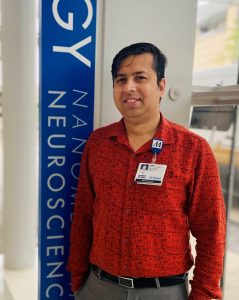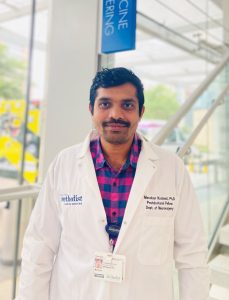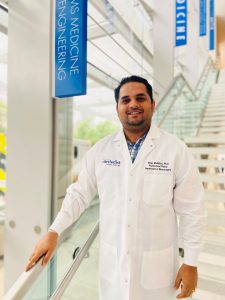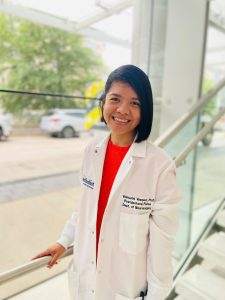
Joy Mitra, PhD
Instructor (Research) (2013-present)
Center for Neuroregeneration
Houston Methodist Research Institute (HMRI)
Email: jmitra@houstonmethodist.org
Phone: 346-238-3830
Dr. Joy Mitra earned his Ph.D. degree in Biotechnology from the University of Calcutta, India. His doctoral studies mainly focused on the development of highly efficient genome manipulation platforms with cutting-edge genetic scissors like Cre-lox, Flp-FRT, Zinc-finger Nuclease, TALEN, and CRISPR/Cas9 based techniques to facilitate the transgene exchange in the plant genome with high precision.
Dr. Mitra joined the Hegde Lab at the Houston Methodist Research Institute in 2014 to investigate the patho-mechanistic roles of RNA/DNA-binding protein TDP-43 proteinopathy in modulating genome instability in motor neurodegenerative diseases, such as amyotrophic lateral sclerosis (ALS) and frontotemporal dementia (FTD). Dr. Mitra discovered the essential roles of TDP-43 in non-homologous end joining (NHEJ) pathway-mediated lethal DNA double-strand break (DSB) repair in motor neurons, shedding light on how TDP-43 plays its scaffolding roles in executing efficient DSB repair in post-mitotic neurons, and the mechanistic implications of ALS-linked pathogenic mutations in TDP-43 to NHEJ repair inhibition on the nuclear genome. Dr. Mitra’s primary research goal is to establish the mechanistic linkage between genome instability and motor/cognitive impairments in order to identify druggable therapeutic targets to manage the neurodegeneration pathology. In addition, he has been involved in other major projects in the Hegde lab examining ALS-FUS pathology and hemorrhagic stroke-associated neurodegeneration, etc.
Dr. Mitra’s research involves mice models of ALS/FTD and Alzheimer’s disease, post-mortem human samples and patients’ iPSC-derived post-mitotic neurons, in combination with state-of-the-art molecular biology and genomic techniques.
Selected Publications:
- Mitra, J.; Guerrero E.N.; Hegde P.M.; Liachko N.F.; Wang H.; Vasquez V.; Gao J.; Pandey A.; Taylor J.P.; Kraemer B.C.; et al. Proc Natl Acad Sci U S A 2019, 116(10):4696-4705. https://doi.org/10.1073/pnas.1818415116.
- Mitra, J.; Hegde P.M.; Hegde M.L. Loss of endosomal recycling factor RAB11 coupled with complex regulation of MAPK/ERK/AKT signaling in postmortem spinal cord specimens of sporadic amyotrophic lateral sclerosis patients. Molecular Brain 2019, 12(1):55. https://doi.org/10.1186/s13041-019-0475-y.
- Guerrero, E.N.; Mitra J.; Wang H.; Rangaswamy S.; Hegde P.M.; Basu P.; Rao K.S.; Hegde M.L. Hum Mol Genet 2019, 28(15):2459-2476. https://doi.org/10.1093/hmg/ddz062.
- Wang, H.; Guo W.; Mitra J.; Hegde P.M.; Vandoorne T.; Eckelmann B.J.; Mitra S.; Tomkinson A.E.; Van Den Bosch L.; Hegde M.L. Nature Communications 2018, 9(1):3683. https://doi.org/10.1038/s41467-018-06111-6.
- Dharmalingam, P.; Talakatta G.; Mitra J.; Wang H.; Derry P.J.; Nilewski L.G.; McHugh E.A.; Fabian R.H.; Mendoza K.; Vasquez V.; et al. ACS nano 2020, 14(3):2827-2846. https://doi.org/10.1021/acsnano.9b05821.

Pavana Dixit (Pavana Dixit Hegde)/ Pavana M. Hegde
Research Associate & Lab Manager
Center for Neuroregeneration
Houston Methodist Research Institute (HMRI),
Email: pdixit@houstonmethodist.org
Phone :713-441-7456
Pavana earned her master’s degree in Biotechnology in 2006 from Kuvempu University, India. She worked as a Research Assistant and then as a Research Associate in the Mitra Laboratory at the University of Texas Medical Branch at Galveston, Texas, USA from 2007 to 2013. She moved with Drs. Mitra and Hegde to the Houston Methodist Research Institute in 2013. She is currently working in the Hegde Laboratory as a Research Associate II and manages laboratory maintenance, safety, ordering, and other administrative activities. Pavana also participates in multiple research activities, working with other members of Hegde laboratory. Her expertise and area of research is as follows:
- Cloning, expression, and purification of human DDR proteins
- Expression and purification of RNA/DNA binding proteins involved in DNA repair
- Protein-protein interactions, western analysis, mitochondria isolation, and farwestern assays
- Native page electrophoresis, tagged protein pull down assays, and mycoplasma testing in cell cultures
Selected Publications (out of 27)
- Hegde PM, Dutta A, Sengupta S, Adhikari S, Tomkinson AE, Li GM, Boldogh I, Hazra TK, Mitra S and Hegde ML. J Biol Chem, 2015, 290(34):20919-33. https://doi.org/10.1074/jbc.M115.642918
- Guerrero EN, Mitra J, Wang H, Rangaswamy S, Hegde PM, Basu P, Rao KS, Hegde ML. Hum Mol Genet. 2019 Sep 15;28(18):3161-3162. https://doi.org/10.1093/hmg/ddz141
- Wang H, Guo W, Mitra J, Hegde PM, Vandoorne T, Eckelmann BJ, Mitra S, Tomkinson AE, Van Den Bosch L, Hegde ML. Nat Commun. 2018 Sep 11;9(1):3683. https://doi.org/10.1038/s41467-018-06111-6
- Hegde ML, Hegde PM, Bellot LJ, Mandal SM, Hazra TK, Li GM, Boldogh I, Tomkinson AE and Mitra S. PNAS, 110(33):E3090-9. Highlighted in various national media and FOX news. https://doi.org/10.1073/pnas.1304231110
- Hegde ML, Hegde PM, Holthauzin LM, Hazra TK, Rao KSJ, and Mitra S. J Biol Chem 285:28812-25. https://doi.org/10.1074/jbc.M110.126664

Manohar Kodavati
Postdoctoral Fellow (2019- Present)
Center for Neuroregeneration
Houston Methodist Research Institute (HMRI)
Email: mkodavati@houstonmethodist.org
Phone: 713-441-7379
Manohar earned his PhD from the Institute of Life Sciences, Bhubaneswar, India. In June 2019, he joined the Hegde laboratory at Houston Methodist. His current research focuses on understanding the mitochondrial role of the Amyotrophic Lateral Sclerosis (ALS) associated fused in sarcoma (FUS) protein. His long-term focus is on understanding unique DNA repair features in neuronal cells.
His expertise and areas of research is as follows:
- Cloning, expression, and purification of proteins from bacterial and eukaryotic systems
- Protein-protein interactions using immunoprecipitation, yeast two hybrid, surface plasmon resonance, and GST-pull down
- Mitochondrial isolation and understanding its genomic instability and biology
- Induced pluripotent stem cell (iPSC) culture and differentiation
- Genome instability characterization using Long amplification PCR (LA-PCR), surveyor nuclease assay, and DNA sequencing
Selected publications (Out of 13)
- Kodavati, M., Wang, H., & Hegde, M. L. (2020). Altered mitochondrial dynamics in motor neuron disease: an emerging perspective. Cells, 9(4), 1065.
- Mitra, J., Wang, H., Kodavati, M., Mitra, S., & Hegde, M. L. (2020). Emerging Roles of Non-canonical RNA Binding Proteins in the Repair of Genome Damage Linked to Human Pathologies. In DNA Damage, DNA Repair and Disease(pp. 301-322).
- Wang, H., Rangaswamy, S., Kodavati, M., Mitra, J., Guo, W., Guerrero, E. N., … & Hegde, M. L. (2019). RT 2 PCR array screening reveals distinct perturbations in DNA damage response signaling in FUS-associated motor neuron disease. Molecular brain, 12(1), 1-5.

Vikas Malojirao
Postdoctoral Fellow ( Feb 2021- Present)
Center for Neuroregeneration
Houston Methodist Research Institute (HMRI)
Email: vhhmalojirao@houstonmethodist.org
Phone:713-441-4656
Vikas Malojirao, Ph.D. obtained his doctorate degree from the Kuvempu University, India in 2019 under the mentorship of Dr. Prabhakar B T. During his doctoral study, he worked on the identification of novel bioactive molecules that can target and kill cancer cells by activating death signals and elucidating their molecular mechanisms using both cell culture and animal model systems. He worked in Promega Corporation, India as an Application scientist from 2019 to 2021. In February 2021, he joined Dr. Hegde’s lab in Houston Methodist Research Institute where he is currently working as a postdoctoral fellow on a project entitled “Consequence of Hemorrhage/Hemin-induced nuclear genome damage and stress response events in cellular senescence and inflammatory signaling”. He participates in multiple research activities, working with other members of Hegde laboratory. His expertise and area of research is as follows:
- Specialized in cancer cell line maintenance, animal models, solid & ascites tumor models, skin cancer models, lung cancer models, and xenograft models
- DNA damage detection, apoptosis and senescence assays (MTT, Trypan blue dye exclusion, TUNEL assay, comet assay, Annexin V staining, Colony formation assay, immunohistochemistry, western blots, immunofluorescence, senescence-associated beta-galactosidase staining, etc.)
- Animal cell culture techniques: Selection and maintenance of cell lines, analysis of cell lines
- Molecular biology and genetic engineering: Isolation of nucleic acids (plasmid DNA, genomic DNA, and RNA), and polymerase chain reaction
- Animal experiments: experience in handling mice, rats, and rabbits
Selected Publications (out of 12)
- Vikas H. Malojirao, Swamy S. Girimanchanaika; Muthu K. Shanmugam; Ankith Sherapura; Dukanya Dukanya; Prashant K. Metri; Vellingiri Vigneshwaran; Arunachalam Chinnathambi; Sulaiman Ali Alharbi; Shobith Rangappa; Chakrabhavi Dhananjaya Mohan; Basappa Basappa; Bettadathunga T. Prabhakar; Kanchugarakoppal S. Rangappa, Novel 1,3,4-oxadiazole targets STAT3 signaling to induce antitumor effect in lung cancer, Biomedicines (2020), 8, 368; https://doi.org/10.3390/biomedicines8090368.
- Vikas H Malojirao, V Vigneshwaran, Prabhu Thirusangu, Riaz Mahmood, BT Prabhakar, The tumor antagonistic steroidal alkaloid Solanidine prompts the intrinsic suicidal signal mediated DFF-40 nuclear import and nucleosomal disruption, Life sciences (2018), 199, 139-150. https://doi.org/10.1016/j.lfs.2018.03.015.
- NaveenPuttaswamy, H. Malojirao, Yasser Hussein Eissa Mohammed, Ankith Sherapura, B.T.Prabhakar, Shaukath Ara Khanum, Synthesis and amelioration of inflammatory paw edema by novel benzophenone appended oxadiazole derivatives by exhibiting cyclooxygenase-2 antagonist activity, Biomedicine & Pharmacotherapy (2018)103,1446–1455. https://doi.org/10.1016/j.biopha.2018.04.167 .
- YHE Mohammed, Vikas H Malojirao, Prabhu Thirusangu, M. Al-Ghorbani, BT Prabhakar, S. A Khanum, The Novel 4-Phenyl-2-Phenoxyacetamide Thiazoles modulates the tumor hypoxia leading to the crackdown of neoangiogenesis and evoking the cell death, European Journal of Medicinal Chemistry (2017) 143, 1826- 1839. https://doi.org/10.1016/j.ejmech.2017.10.082 .

Velmarini Vasquez, PhD
Postdoctoral Fellow, II
Center for Neuroregeneration
Houston Methodist Research Institute (HMRI)
Velmarini Vasquez earned her Ph.D. in Biotechnology from Acharya Nagarjuna University, India, in September 2019, under a joint program with INDICASAT AIP, Rep. of Panama. Dr. Vásquez performed her graduate research studies under the co-mentorship of Dr. Muralidhar L. Hegde at the Houston Methodist Research Institute, USA and Dr. Jagannatha Rao at INDICASAT-AIP. Her research work provided essential insights into how the aggregation-prone protein a-synuclein mediates genome damage and mitochondrial dysfunction in Parkinson’s disease. This work is documented in two first-author research articles published in the Journal of Alzheimer’s Disease and one review article published in the journal Progress in Neurobiology. After earning her Ph.D., Velmarini returned to INDICASAT-AIP where she focused on determining the neuroprotective benefits of curcumin and mamey fruit derivatives, synthesized by her research group and designed to target amyloid proteinopathy, oxidative stress, and mitochondrial dysfunction at the early stages of Parkinson’s and Alzheimer’s disease. Velmarini has since joined Hegde lab in 2022 as postdoctoral fellow to pursue studies on RNA binding protein toxicity and mitochondrial dysfunctions in neurological disorders predisposition after cellular stress responses in brain such as hemorrhage.
Her research expertise includes:
- Development of inducible alpha-synuclein cellular models
- Stem cell culture under both feeder-free and feeder-associated layers; differentiation of neural stem cell lineage into different types of neurons
- Routine molecular biology techniques, rDNA technology, western blotting, immunofluorescence, chromatin immunoprecipitation, proximity ligation assay, in vitro protein-protein interaction assay, protein expression, and purification in bacterial system
Selected Publications
- Vasquez, V.; Mitra J.; Wang H.; Hegde P.M.; Rao K.S.; Hegde M.L. A multi-faceted genotoxic network of alpha-synuclein in the nucleus and mitochondria of dopaminergic neurons in Parkinson’s disease: Emerging concepts and challenges. Prog Neurobiol 2020, 185:101729. https://doi.org/10.1016/j.pneurobio.2019.101729.
- Vasquez, V.; Mitra J.; Perry G.; Rao K.S.; Hegde M.L. An Inducible Alpha-Synuclein Expressing Neuronal Cell Line Model for Parkinson’s Disease1. J Alzheimers Dis 2018, 66(2):453-460. https://doi.org/10.3233/jad-180610.
- Vasquez, V.; Mitra J.; Hegde P.M.; Pandey A.; Sengupta S.; Mitra S.; Rao K.S.; Hegde M.L. Chromatin-Bound Oxidized α-Synuclein Causes Strand Breaks in Neuronal Genomes in in vitro Models of Parkinson’s Disease. J Alzheimers Dis 2017, 60(s1):S133-s150. https://doi.org/10.3233/jad-170342.
- Berrocal, R.; Vasquez V.; Rao Krs S.; Gadad B.S.; Rao K.S. α-Synuclein Misfolding Versus Aggregation Relevance to Parkinson’s Disease: Critical Assessment and Modeling. Mol Neurobiol 2015, 51(3):1417-1431. https://doi.org/10.1007/s12035-014-8818-2.
Book Chapter
• Ion-Catalyzed Reactive Oxygen Species in Sporadic Models of Parkinson’s Disease. Vasquez V, Mitra J, Guerrero EN, Hegde PM, Rao KS and Hegde ML. Mitochondrial Mechanisms of Degeneration and Repair in Parkinson’s Disease. Springer, ISBN 978-3-319-42139-1. Pages 75-113.
FORMER LAB MEMBERS
VISITING SCIENTIST
- Dibyendu Banerjee, Visiting Scientist, CDRI, Lucknow, India (2019)
- Dr. Janaki Ramaiah Mekala, Visiting Scientist, Department of Biotechnology KL Deemed University, Guntur, India (2023)
POST-DOCTORAL / RESEARCH ASSOCIATE TRAINEES
- Prakash Dharmalingam, PhD (Postdoctoral Fellow 2015-2017)
- Suganya Rangaswamy, PhD (Postdoctoral Fellow 2016-2018)
- Girish Talakatta, PhD (Postdoctoral Fellow 2018-2019)
PRE-DOCTORAL TRAINEES
- Erika Guerrero, MS (Ph.D. student 2012-2019)
- Velmarini Vasquez, MS (Ph.D. student 2013-2019)
- Vincent Provasek, BS (MD/Ph.D. student 2021-2024)
LABORATORY RESEARCH ASSISTANTS
- Vishnupriya Borra, MS (Research Associate 2012-2013)
- Priyadarshini Basu, MS (Research Technician 2018-2018)
- Haibo Wang, PhD (Research Assistant/Research Scientist, 2013-2023)
UNDERGRADUATE STUDENTS
- Rodrigo Juan Trujillo, BS (2017-2018)
SUMMER RESEARCH INTERNS
- Joey Gu (2015)
- Saher Zaidi (2015)
- Daniella Martinez (2016)
- Vish Pathak (2017 / 2018)
- Sanjana Babu (2018)
- Carla Vilardo (2017)
- Elaine Thong (2019)
- Sheila Patel (2019)
- Jose Ortiz Alejos (2021)
- Leslie Gorethy Ruiz Lozano (2022)
- Santiago Villarreal Desentis (2023)
